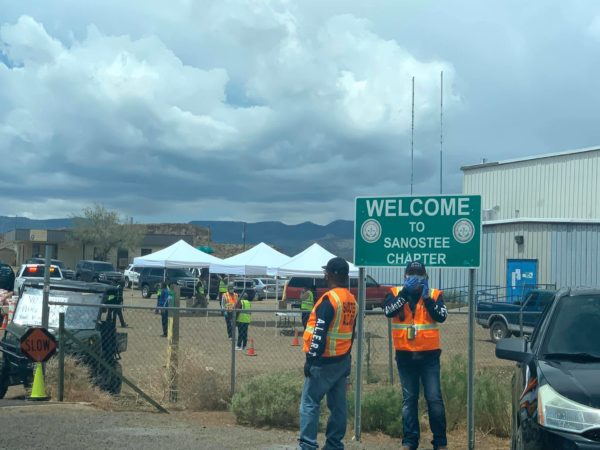
- Details
- By Levi Rickert
Monday Update: 82 new cases of COVID-19 and two more deaths reported,
WINDOW ROCK, Ariz. — The HuffPost on Monday pointed out the Navajo Nation “marked a grim milestone on Sunday, recording more coronavirus cases per capita on its reservation than any of the 50 U.S. states.”
With the 173,776 people living on the Navajo Nation, the 3,122 cases means the reservation’s rate of infection is roughly 1,798 per 100,000 people.
“By comparison, the states with the most known cases ― New York, New Jersey and Massachusetts ― have reported 1,751 cases per 100,000 people, 1,560 cases and 1,129 cases, respectively,” the HuffPost reported.
Monday Update
The Navajo Department of Health in coordination with the Navajo Epidemiology Center and the Navajo Area Indian Health Service, reported 82 new cases of COVID-19 for the Navajo Nation and a total of 102 deaths as of Monday. The total number of positive COVID-19 cases for the Navajo Nation has reached 3,204, many of whom have recovered or are in the process of recovering from the virus.
The 3,204 confirmed positive cases on the Navajo Nation include the following counties:
- McKinley County, NM: 865
- Apache County, AZ: 825
- Navajo County, AZ: 665
- Coconino County, AZ: 331
- San Juan County, NM: 374
- San Juan County, UT: 53
- Socorro County, NM: 26
- Cibola County, NM: 36
- Bernalillo County: 3
- Sandoval County, NM: 26

Navajo Nation President Jonathan Nez and Vice President Myron Lizer announced that the Navajo Nation will extend its declaration of a state of emergency and the closure of Navajo Nation government offices — the timeline of the extension is still being determined. The current Executive Order is set to expire on May 17.
“Some states are beginning to reopen, but here on the Navajo Nation we’re listening to the advice of our health care experts and based on the data and the facts, we’re not ready to reopen until we see a consistent downward trend in the number of new COVID-19 cases. We’re going to continue to be on the ground in our communities helping our elders and high-risk residents so they can stay home and stay safe. We are strong and resilient when we unify and work together. Thank you to everyone who has reached out to offer their support and encouragement along the way,” Navajo Nation President Jonathan Nez said.
For more information including reports, helpful prevention tips, and more resources, please visit the Navajo Department of Health’s COVID-19 website at http://www.ndoh.navajo-nsn.gov/COVID-19. To contact the main Navajo Health Command Operations Center, please call (928) 871-7014.
_________________________________________________________________
To Donate to the Navajo Nation
The official webpage for donations to the Navajo Nation, which has further details on how to support the Nation’s Dikos Ntsaaígíí-19 (COVID-19) efforts is: http://www.nndoh.org/donate.html.
_________________________________________________________________
For More Information
For more information including reports, helpful prevention tips, and more resources, please visit the Navajo Department of Health’s COVID-19 website at http://www.ndoh.navajo-nsn.
For up to date information on impact the coronavirus pandemic is having in the United States and around the world go to: https://www.worldometers.info/coronavirus/country/us/?
More Stories Like This
Native News Weekly (August 25, 2024): D.C. BriefsNavajo Utah Commission Approves Six New Weather Stations
First Peoples Fund Announces 2026 Cultural Capital Fellows
Deb Haaland Campaign Responds to Why Her Name is in the Epstein Files
Cadiz, Inc. Announces EPA Selection of Mojave Groundwater Bank Northern Pipeline Project for WIFIA Loan Application
Help us defend tribal sovereignty.
At Native News Online, our mission is rooted in telling the stories that strengthen sovereignty and uplift Indigenous voices — not just at year’s end, but every single day.
Because of your generosity last year, we were able to keep our reporters on the ground in tribal communities, at national gatherings and in the halls of Congress — covering the issues that matter most to Indian Country: sovereignty, culture, education, health and economic opportunity.
That support sustained us through a tough year in 2025. Now, as we look to the year ahead, we need your help right now to ensure warrior journalism remains strong — reporting that defends tribal sovereignty, amplifies Native truth, and holds power accountable.
 The stakes couldn't be higher. Your support keeps Native voices heard, Native stories told and Native sovereignty defended.
The stakes couldn't be higher. Your support keeps Native voices heard, Native stories told and Native sovereignty defended.
Stand with Warrior Journalism today.
Levi Rickert (Potawatomi), Editor & Publisher

